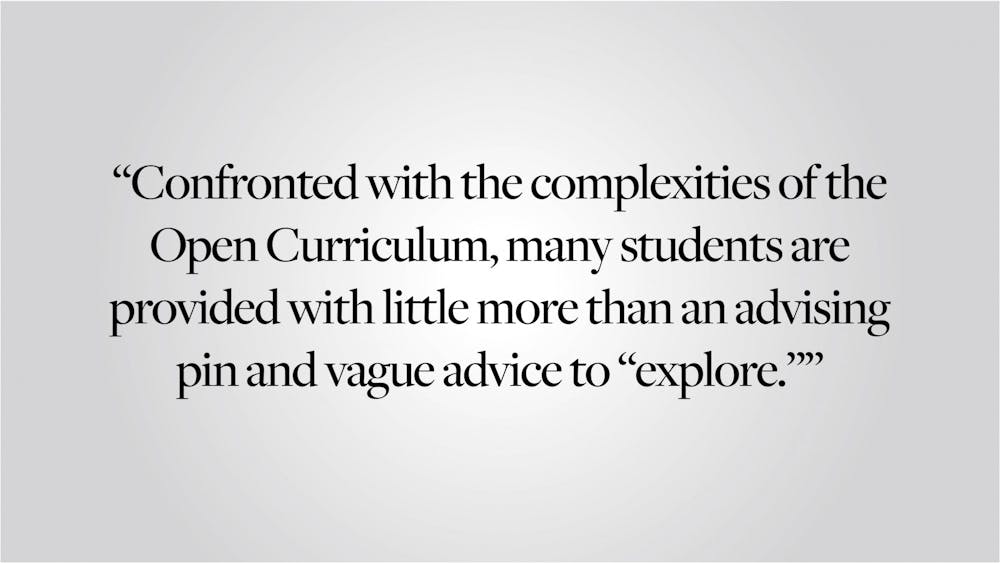Academic advising comes in many forms at Brown — from the Meiklejohn peer advising program to professors’ office hours. But all students’ initial exposure to advising is the same. First-year advisors — the professors, deans and academic administrators who offer advice to students as they navigate their first months in college — are students’ first guides through a daunting Open Curriculum. These advisors have the potential to positively shape a student’s college experience, but the program as it stands falls short.
While many students come to Brown with some idea of what they want to pursue, many are not assigned an advisor whose background is aligned with their interests. Some are even assigned administrators who have no connection with any academic department at all. The fortunate might receive useful supplementary advice from their Meiklejohn, but the rest are left to fend for themselves.
Students should have better access to specific curricular advice related to potential fields of study through their first-year advisors. Certain concentrations like chemistry and computer science often entail complex introductory sequences, and knowing their nuances early on could fundamentally alter a student’s trajectory. The Brown cliché of taking a diverse array of classes is useful advice, but cannot replace substantive information about specific curricular programs. First-year advisors are well-positioned to provide this information as students’ default academic resource, but often fail to do so because they lack relevant expertise.
We acknowledge that interest-aligned advising might not make sense across the board. Many students come in undecided about their course plan, and even those with a plan in mind could benefit from an advisor who exposes them to new academic fields. And in the advising system’s current setup, there are most likely not enough advisors to match each student to one who works in their field of interest.
In any case, the current approach is in need of repair. Brown boasts small advisory groups for first-years, but this is pointless if advisors cannot adequately support students with informed advice. Why not have fewer advisors and larger advisory groups, if we ensure that every advisor can provide effective guidance for their advisees’ academic goals? Why not hire and train more employees who specialize in advising?
Underlying this all, the University should find ways to ensure and improve the quality of its existing advisors. Currently, there is wide variation among first-year advisors. Some are enthusiastic and engaged with all facets of undergraduate success, while others limit their involvement to a short email with an advising pin once a semester. Some are seasoned professors well-informed about undergraduate studies, while others are administrators who know little about the academic experience at Brown.
A lack of accountability for subpar advising perpetuates these issues. When first-year advising relationships are unsuccessful, there is no clear system for giving feedback on an advisor or how to improve the program more broadly. Without any feedback mechanism, many advisors who put minimum-at-best effort into supporting their advisees skate by without the University’s knowledge. It is telling that, in 2013, this Board wrote an editorial advocating for a better first-year advising experience, yet eight years down the line, little has changed.
Another part of the problem is the University’s failure to publicize, update and organize its advising resources. Brown’s advising web page lists programs such as the “Faculty Advising Fellows” and the “Randall Sophomore Advisors,” which many students have never even heard of. Other resources, such as Departmental Undergraduate Groups and department-specific advisors, are often useful, but are scattered and challenging for first-years to access.
We imagine a world where advising resources are more comprehensive, cohesive and accessible, and we imagine a first-year advising program that better connects first-years to those resources. Rather than bouncing between disparate advising resources, students would have a unified support network — with intentional pairings between first-years and their advisors, who can in turn connect their advisees to resources relevant to their interests and that might compensate for advisors’ shortcomings. Presently, the first-year advising experience feels inadequate and isolated from other resources. Confronted with the complexities of the Open Curriculum, many students are provided with little more than an advising pin and vague advice to “explore.”
Students should also feel empowered — with the encouragement of the University — to look outside traditional advising relationships and advocate for themselves, both during their first year and beyond. As is noted on Brown’s advising website, “students will also build advising relationships with course instructors, with peers and with various administrators and special faculty advisors on campus.” First-years, don’t be afraid to go to a professor’s office hours or email an upperclassman from one of your classes to ask for their advice — they’ll probably be delighted to help. Some of these less formal advising and guiding relationships could be the most meaningful in your time at Brown.
Still, a better formal first-year advising experience is crucial in easing students into Brown’s many academic pathways. Brown should find ways to support its first-years with well-communicated and robust access to knowledgeable advisors, making sure every student gets off on the right foot.
— Editorials are written by The Herald’s editorial page board. This editorial was written by its editor Johnny Ren ’23, and members Catherine Healy ’22, Olivia Burdette ’22, Devan Paul ’24 and Kate Waisel ’24.





